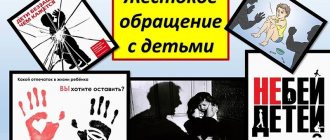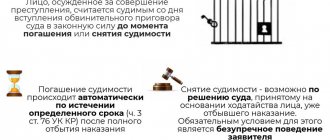Tweet
In 2013, the Constitutional Court of the Russian Federation declared unconstitutional a number of conditions for admission to work of persons with a criminal record and obliged legislators to make changes to the Labor Code of the Russian Federation. In August 2015, the Government of the Russian Federation determined how an employee with a criminal record can obtain permission to work in schools and other children's institutions.
Initially, people with any criminal background were prohibited from working with children. Upon receipt of a conviction for a serious crime, the TD was terminated under clause 13, part 1, art. 83 Labor Code of the Russian Federation.
Subsequently, the Constitutional Court of the Russian Federation significantly softened the prohibition established by Law No. 387-FZ. In July 2013, the Constitutional Court judges came to the conclusion that Law No. 387-FZ violates the rights of citizens (Resolution No. 19-P dated July 18, 2013; hereinafter referred to as Constitutional Court Resolution No. 19-P). At the same time, the decision of the Constitutional Court of the Russian Federation was largely Solomonic, since the ban was partially recognized as lawful. Thus, the court decided that refusal to hire or dismissal from it is legal if employees: - have a criminal record for committing crimes listed in paragraph. 3 hours 2 tbsp. 331 and art. 351.1 Labor Code of the Russian Federation;
- had a criminal record for committing grave and (or) especially grave crimes from among the crimes named in paragraph. 3 hours 2 tbsp. 331 and art. 351.1 Labor Code of the Russian Federation;
- had a criminal record for committing crimes against sexual integrity and sexual freedom of the individual.
In relation to employees with expunged or expunged criminal records for crimes of light and moderate gravity, the Constitutional Court of the Russian Federation ordered that a number of circumstances be taken into account in order to make a final decision on their hiring or dismissal. These circumstances included:
- type and severity of the crime committed;
- the period that has passed since its commission;
- form of guilt;
— the employee’s behavior after the commission of a crime;
— attitude to work responsibilities, etc.
The same applied to those persons whose criminal prosecution was terminated on non-rehabilitative grounds.
The Constitutional Court of the Russian Federation also drew attention to the fact that Law No. 387-FZ allowed dismissal even if the crime they committed had already been decriminalized. And this is a direct violation of the constitutional principle of equality of all before the law.
In addition, the Constitutional Court of the Russian Federation obliged to use the procedure of temporary suspension from work of persons who are suspected or accused of committing a criminal offense from the list provided for in Art. 331 and 351.1 of the Labor Code of the Russian Federation. This resolved the question of what to do with the employee if law enforcement agencies’ suspicions against him were not confirmed. In 2014, amendments were made to the Labor Code of the Russian Federation, which specified that an employee is suspended from work for the entire period of criminal proceedings until its termination or until the court verdict comes into force. Moreover, it does not matter what crime the employee is suspected of. It was also indicated that the list of types of crimes, the commission of which clearly prevents the continuation of work with children, needs to be adjusted and those that clearly indicate the impossibility of continuing work should be retained. However, instead, legislators, on the contrary, expanded this list by adding crimes against the foundations of the constitutional order and state security (Federal Law No. 27-FZ dated April 1, 2012). Subsequently, more crimes against the peace and security of mankind were added to this list (Federal Law No. 237-FZ dated July 13, 2015).
Where can people with a criminal record not work?
It is possible for persons with a criminal record to be admitted to work by a commission on juvenile affairs, but not in all cases. From the article you will learn in which cases a criminal record will not interfere with working with minors.
The prohibition to engage in certain types of activities for persons who have (had) a criminal record is established by the Labor Code and other federal laws.
According to Art. 331 and 351.1 of the Labor Code of the Russian Federation are:
- pedagogical activity;
- activities in the field of education, upbringing, development of minors, organization of their recreation and recovery, medical care, social protection and social services, in the field of children's and youth sports, culture and art with the participation of minors.
A similar ban is also established for:
- civil servants ( Article 16 of the Federal Law of July 27, 2004 No. 79-FZ “On the State Civil Service of the Russian Federation”);
- bailiffs (Article 3 of the Federal Law of July 21, 1997 No. 118-FZ “On Bailiffs”);
- police officers ( Article 29 of the Federal Law of 02/07/2011 No. 3-FZ “On the Police”);
- aviation personnel specialists ( Article 52 of the RF Military Code);
- prosecutorial workers ( Article 40.1 of the Federal Law of January 17, 1992 No. 2202‑1 “On the Prosecutor’s Office of the Russian Federation”);
- employees of the internal affairs department ( Article 14 of the Federal Law of November 30, 2011 No. 342-FZ “On service in the internal affairs bodies of the Russian Federation and amendments to certain legislative acts of the Russian Federation”); and etc.
As for specific positions that cannot be held by persons who have (had) a criminal record, the Labor Code does not establish such positions. In accordance with Art. 331 of the Labor Code of the Russian Federation, these include positions related specifically to teaching activities. Let us note that the right to engage in teaching activities is available to persons who have secondary vocational or higher education and meet the qualification requirements specified in qualification reference books and (or) professional standards ( Article 46 of the Federal Law of December 29, 2012 No. 273‑FZ “On Education In Russian federation" ).
The nomenclature of positions for teaching staff of organizations engaged in educational activities was approved by Decree of the Government of the Russian Federation dated 08.08.2013 No. 678 . In addition to teachers and professors, these include educators, instructors, methodologists, counselors, etc.
Based on Art. 351.1 of the Labor Code of the Russian Federation, this can be any position related to the field of education, medical care, social protection and social services, sports, culture and art, if minors take part in them.
Taking into account the provisions of these articles, as well as established judicial practice, we can conclude that a person with a criminal record does not have the right to occupy teaching positions, regardless of the age of the students, and almost any position in any field of activity if it is related to interaction with minors: Deputy Director schools on the administrative and economic side ( Appeal ruling of the Arkhangelsk Regional Court dated 09/11/2014 in case No. 33-4576 ), a kindergarten janitor ( Appeal ruling dated 08/22/2012 in case No. 33-6762 ), etc.
If the defendant was acquitted, then no restrictions can be applied to him.
Restrictions are provided for convicts with a criminal record, including an expunged one.
Article 351.1 of the Labor Code. Restrictions on employment in the field of education, upbringing, development of minors, organization of their recreation and health, medical care, social protection and social services, in the field of children's and youth sports, culture and art with the participation of minors
to work in the field of education, upbringing, development of minors, organization of their recreation and recovery, medical care, social protection and social services, in the field of children's and youth sports, culture and art with the participation of minors , and equally those who were subject to criminal prosecution (with the exception of persons in respect of whom criminal prosecution was terminated on rehabilitative grounds) for the crimes specified in paragraphs three and four of part two of Article 331 of this Code, with the exception of cases provided for in part three of this article.
Along with the cases specified in Article 76 of this Code, the employer is obliged to remove from work (not allow to work) an employee in the field of education, upbringing, development of minors, organization of their recreation and recovery, medical care, social protection and social services, in the field of children and youth sports, culture and art with the participation of minors upon receipt from law enforcement agencies of information that this employee is being subjected to criminal prosecution for crimes specified in paragraphs three and four of part two of Article 331 of this Code. The employer suspends the employee from work (does not allow him to work) for the entire period of the criminal proceedings until it is terminated or until the court verdict comes into force.
Persons from those specified in paragraph three of part two of Article 331 of this Code who have had a criminal record for committing crimes of minor gravity and crimes of medium gravity against life and health, freedom, honor and dignity of the individual (with the exception of illegal hospitalization in a medical organization providing psychiatric care in inpatient facilities) conditions, and slander), family and minors, public health and public morality, the foundations of the constitutional order and security of the state, as well as against public safety, and persons against whom criminal prosecution on charges of committing these crimes was terminated on non-exonerating grounds may be admitted to work in the field of education, upbringing, development of minors, organization of their recreation and recovery, medical care, social protection and social services, in the field of children's and youth sports, culture and art with the participation of minors, subject to a decision of the commission on minors' affairs and protection their rights, created by the highest executive body of state power of a constituent entity of the Russian Federation, on their admission to the relevant type of activity.
Article 331 of the Labor Code of the Russian Federation. The right to engage in teaching activities Persons who have an educational qualification are allowed to engage in teaching activities, which is determined in the manner established by the legislation of the Russian Federation in the field of education. (as amended by Federal Laws dated July 2, 2013 N 185-FZ, dated December 22, 2014 N 443-FZ)
Persons who are deprived of the right to engage in teaching activities in accordance with a court verdict that has entered into legal force are not allowed to engage in teaching activities; have or have had a criminal record, have been subject to criminal prosecution (with the exception of persons against whom criminal prosecution has been terminated on rehabilitative grounds) for crimes against life and health, freedom, honor and dignity of the individual (with the exception of illegal hospitalization in a medical organization providing psychiatric care in inpatient settings) conditions, and slander), sexual integrity and sexual freedom of the individual, against family and minors, public health and public morality, the foundations of the constitutional system and state security, as well as against public safety, except for the cases provided for in part three of this article; (as amended by Federal Law No. 489-FZ of December 31, 2014) who have an unexpunged or outstanding conviction for other intentional grave and especially grave crimes not specified in paragraph three of this part; (as amended by Federal Law No. 489-FZ of December 31, 2014) recognized as legally incompetent in the manner prescribed by federal law; having diseases included in the list approved by the federal executive body exercising the functions of developing state policy and legal regulation in the field of healthcare. (Part two as amended by Federal Law No. 387-FZ dated December 23, 2010) Persons from those specified in paragraph three of part two of this article who have had a criminal record for committing crimes of minor gravity and crimes of medium gravity against life and health, freedom, honor and dignity individuals (with the exception of illegal hospitalization in a medical organization providing psychiatric care in an inpatient setting, and slander), family and minors, public health and public morality, the foundations of the constitutional order and state security, as well as against public safety, and persons subject to criminal prosecution in whose charges of committing these crimes have been terminated on non-rehabilitative grounds, may be admitted to teaching activities if there is a decision of the commission on affairs of minors and protection of their rights, created by the highest executive body of state power of a constituent entity of the Russian Federation, on their admission to teaching activities.
Types of criminal records
A criminal record provides for special legal relations between the state and the convicted person. It is established by a court verdict and continues until its withdrawal or repayment (Article 86 of the Criminal Code of the Russian Federation).
After serving the sentence, the convicted person is not immediately recognized as not having a criminal record. The length of a criminal record depends on the severity of the act committed.
Until then, the citizen is still recognized as potentially dangerous, therefore he is under the supervision of law enforcement agencies, and for new crimes he is charged with harsher punishment.
The following types of criminal records exist:
- Current: the offender is still serving a sentence or has recently been released from it, but the statute of limitations on the criminal record has not yet passed.
- Conditional: established for conditionally convicted citizens.
- Expunged: means that the person, upon returning from prison, has not committed a crime after a certain period.
- Expunged conviction: removed by the court early due to the good behavior of the convicted person or other reasons, for example, pardon or amnesty.
Information about a citizen’s criminal record is stored in the GIAC of the Russian Federation . The only way to remove it from this database is to remove it for exonerating circumstances, that is, to find the citizen innocent of committing a previously charged criminal offense.
General restrictions
The list of grounds on which an individual cannot be admitted to teaching activities is given in Part 2 of Article 331 of the Labor Code of the Russian Federation. Moreover, these restrictions are also relevant for hiring in advanced training or retraining centers, where, as a rule, adult specialists and employees are trained.
We list the categories of persons who cannot work as teachers:
1) deprived of the right to engage in teaching activities in accordance with a court verdict that has entered into legal force;
2) having an unexpunged or outstanding conviction for intentional grave and especially grave crimes;
3) recognized as incompetent;
4) having diseases that are included in the list approved by Decree of the Government of the Russian Federation of December 1, 2004 No. 715;
5) who have or have had a criminal record, are or have been subject to criminal prosecution for crimes:
- against life and health, freedom, honor and dignity of the individual;
- sexual integrity and sexual freedom of the individual, against family and minors, public health and public morality;
- foundations of the constitutional order and state security;
- against public safety.
Not every conviction entails a ban
Paragraph 2 of the operative part of the resolution of the Constitutional Court of the Russian Federation dated July 18, 2013 No. 19-P declared illegal certain provisions of the Labor Code of the Russian Federation, which provide for a ban on teaching activities for persons who have committed crimes (except for serious and especially serious ones).
After all, such a prohibition does not take into account the type and severity of the crime committed, the period that has passed since its commission, the form of guilt, the circumstances characterizing the person, including the behavior of the person after the commission of the crime, etc.
In other words, in relation to such persons, the employer must take into account factors that allow them to assess the possibility of these persons carrying out professional activities related to regular contact with minors, without the risk of endangering their life, health and morals.
This is also indicated in paragraph 7 of the decision of the Constitutional Court of the Russian Federation of February 4, 2014 “On approval of the review of the practice of the Constitutional Court of the Russian Federation for the third and fourth quarters of 2013.”
However, the Constitutional Court of the Russian Federation did not indicate a list of such factors. Therefore, until changes are made to the Labor Code of the Russian Federation by the corresponding bill, the employer must independently decide whether he can hire a teacher who has a criminal record.
It can be assumed that factors speaking in favor of the employee may be the absence of criminal prosecution for other crimes, the absence of disciplinary sanctions, positive recommendations from the last place of work, and other positive qualities and characteristics of the person.
Restrictions on permission to work with children
According to Art. 331 and 351.1 of the Labor Code of the Russian Federation, teachers and other employees in the areas of development, upbringing and education of minors, sports, culture and art, their social protection, medical care, health improvement and recreation, who have been subject to criminal prosecution (except rehabilitated persons) had or have a criminal record.
However, a criminal record is taken into account only if certain categories of crimes were committed.
These include crimes against:
- personality (Section 7 of the Criminal Code of the Russian Federation), for example, kidnapping;
- public safety and order (Chapter 24, 25 Section 9 of the Criminal Code of the Russian Federation), for example, a false report of a terrorist act;
- state power (Chapter 29 of the Criminal Code of the Russian Federation), for example, a public call for extremism;
- peace and security of mankind (Chapter 34 of the Criminal Code of the Russian Federation), for example, rehabilitation of Nazism.
If the case is closed
The Labor Code of the Russian Federation provides for the refusal to hire a person, even if he was not convicted, but only subjected to criminal prosecution.
In this case, the criminal case must be terminated on non-rehabilitating grounds.
However, the current legislation does not disclose the concepts of rehabilitating and non-rehabilitating grounds for exemption from criminal prosecution.
Article 133 of the Criminal Procedure Code of the Russian Federation provides only a list of rehabilitated persons. These include:
1) the defendant against whom a verdict of acquittal was made;
2) a defendant whose criminal prosecution has been terminated due to the public prosecutor’s refusal to charge;
3) a suspect or accused, criminal prosecution against whom was terminated on the grounds provided for in paragraphs 1, 2, 5 and 6 of part 1 of Article 24, paragraphs 1 and 4-6 of part 1 of Article 27 of the Criminal Procedure Code of the Russian Federation (lack of corpus delicti, lack of statement (if it is required to initiate a case), non-involvement, etc.);
4) convicted person - in cases of complete or partial cancellation of a court conviction that has entered into legal force and termination of a criminal case on the grounds provided for in paragraphs 1 and 2 of part 1 of Article 27 of the Criminal Procedure Code of the Russian Federation;
5) a person to whom compulsory measures of a medical nature were applied - in the event of the cancellation of an illegal or unfounded court decision on the application of this measure to an individual.
This list can also be used as a guide in the event of hiring a teacher against whom the court case was closed.
But if the persecution is terminated on other grounds, for example, if the parties have reconciled, the applicant should be denied employment, and in the case of persecution during work, the employment contract with such a teacher should be terminated.
Important to remember
It follows from the norms of labor legislation that the presence of a criminal record among the teacher’s relatives (his husband or wife, children, parents) does not establish a ban on engaging in teaching activities.
Procedure for admitting persons with a criminal record to work with minors
Those convicted of the above categories of crimes may sometimes work with children. An exception may be made by the regional commission for minors and the protection of their rights upon a written statement from a convicted person or a person who has been subject to criminal prosecution.
However, an exception is allowed only if the candidate was suspected, accused, tried, or exonerated on non-exonerating grounds for committing a minor or moderate crime.
The procedure for submitting an application, the work of the commission and making decisions is established by the Rules approved by Decree of the Government of the Russian Federation dated 05.08.2015 No. 796.
After receipt by the commission, an application drawn up in compliance with the requirements specified in paragraphs. 5, 6 of the Rules, registered. The applicant is invited to a meeting of the commission, where the issue of his admission to work with minors will be considered. A decision is made over the next 30 days. The circumstances that the commission takes into account are listed in clause 20 of the Rules. For example, the type of punishment, form of guilt, compensation for damage, and attitude towards the performance of job duties are taken into account.
Thus, as an exception, citizens who have been convicted or have been released from charges on non-rehabilitative grounds may be allowed to work with minors if a decision on this is made by the regional commission for minors and the protection of their rights. However, such a decision cannot be made in relation to those convicted of serious crimes.
Who needs a license
You can organize parties for children without a license. Organizing recreation, including summer camps in the city, is also possible, but first get into the register of “register of organizing recreation and health improvement for children.” This obligation has appeared since 2022.
The most questions arise about the educational license. Entrepreneurs read in the law that it is needed when training is carried out according to educational programs, and students are given certificates based on the results. But the absence of educational programs does not exempt from licenses.
The most important thing is whether the company is actually engaged in education or entertainment. Education is a complex process, with a lesson plan and specific topics. Entertainment - when a child loses nothing by missing a lesson, only pleasure.
A language school almost always needs a license, and so does preparing children for school. You don’t need it for a chess club or football section, where children come just to have fun.
An exception is individual entrepreneurs without employees. They have the right to engage in education without a license.
When a company is engaged in education, it applies OKVED 85.11 and 85.41. When not, he works according to type of activity 93.29.9. It is important not to get confused: if you indicate the educational OKVED, there may be questions from Rosobrnadzor.
The education license is issued by the regional department of Rosobrnadzor. To receive it, you will need to fulfill the requirements from Government Decree No. 966 of October 28, 2013. The resolution also refers to sanitary regulations and fire safety rules. They are especially tough when working with children.
Article about licenses for educational activities










